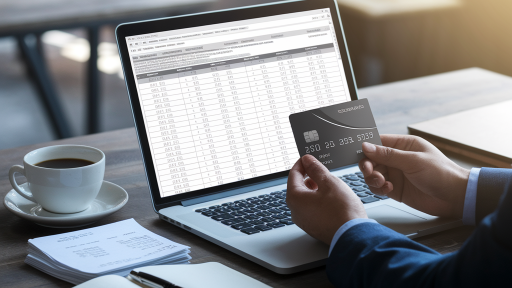Starting a new venture is an exciting journey, often beginning with a simple idea and a whole lot of hustle. In those early days, it’s tempting to reach for your personal credit card to cover startup costs—a new laptop, website hosting, or initial inventory. It’s familiar, it’s easy, and it’s right there in your wallet.
But as your business grows from a side project into a serious operation, the lines can start to blur. That seamless convenience can quickly morph into a bookkeeping nightmare and even put your personal assets at risk. This brings up a crucial question for every entrepreneur, freelancer, and small business owner: should you stick with a personal credit card or is it time to get a dedicated business one? Understanding the distinction is the first step toward sound financial management.
What’s the Fundamental Difference? A Quick Overview
At their core, the primary difference between a business and a personal credit card lies in their intended purpose. A personal card is issued to an individual for household, family, and other non-commercial expenses. A business credit card, on the other hand, is issued to a company (even a sole proprietorship) specifically for business-related expenditures.
This fundamental distinction drives a host of other differences in how they are underwritten, how they report to credit bureaus, and the features they offer. While they may both offer rewards and a line of credit, they operate in separate financial ecosystems. One is tied to your personal life, and the other is a tool for your professional growth.
| Feature | Personal Credit Card | Business Credit Card |
|---|---|---|
| Primary Purpose | Personal, family, and household expenses. | Business-related expenses only. |
| Liability | The individual cardholder is solely responsible for the debt. | Usually tied to the business, but often requires a personal guarantee from the owner. |
| Credit Reporting | Reports to personal credit bureaus (Experian, Equifax, TransUnion). | Reports to business credit bureaus (e.g., Dun & Bradstreet). May also report to personal bureaus, especially in cases of default. |
| Rewards & Perks | Geared towards consumer spending (groceries, gas, dining, travel). | Tailored for business spending (office supplies, shipping, advertising, software). |
| Legal Protections | Strong protections under the CARD Act of 2009 (e.g., limits on interest rate hikes). | Fewer consumer protections; the CARD Act does not apply. |
The Case for a Personal Credit Card
For someone just starting out—perhaps a freelancer with very few expenses or someone testing a business idea on the side—using a personal credit card can feel like the path of least resistance. The application process is straightforward and relies on your established personal credit history, making it accessible even before your business has a track record.
Key Benefits of Using a Personal Card (Initially)
- Simplicity: There’s no need to open new accounts or manage separate logins. You use the card that’s already in your wallet.
- Easy Application: Approval is based on your personal income and credit score, which is often stronger than a brand-new business’s financial profile.
- Leveraging Existing Credit: If you have a high personal credit limit, you can use it to fund initial business costs without needing to apply for new credit.
The Significant Drawbacks and Risks
While simple at first, relying on a personal card for business can lead to serious complications down the road. These drawbacks often far outweigh the initial convenience.
- Commingling Funds: Mixing business and personal expenses is a cardinal sin in accounting. It makes it incredibly difficult to track your business’s profitability and can create a massive headache during tax season.
- Risk to Personal Credit: Business expenses can be high and variable. A large purchase for inventory or equipment can cause your personal credit utilization ratio to spike, which can significantly lower your personal credit score.
- Piercing the Corporate Veil: If you operate as an LLC or corporation, routinely using personal funds for business expenses can blur the legal line between you and your company. In a lawsuit, a court could potentially “pierce the corporate veil,” making your personal assets (like your home and savings) vulnerable.
- Lost Business Perks: Personal card rewards are not optimized for business spending. You could be missing out on higher cashback rates on things like office supplies, internet services, and advertising spend.
Why You Should Get a Business Credit Card
Transitioning to a dedicated business credit card is a sign of a maturing business. It’s a strategic tool that offers far more than just a line of credit; it provides a framework for financial organization, protection, and growth. For any serious entrepreneur, it’s not a matter of if, but when.
Build and Protect Your Credit Profiles
One of the most powerful reasons to get a business credit card is to establish a separate credit identity for your company. Just as you have a personal credit score, your business can build its own credit profile with agencies like Dun & Bradstreet and the Small Business Financial Exchange (SBFE). A strong business credit history can unlock better terms on future loans, leases, and insurance policies.
Simultaneously, it creates a firewall for your personal credit. By offloading large business purchases onto a business card, you keep your personal credit utilization low and stable. Most business cards do not report to personal credit bureaus unless you fall seriously behind on payments, protecting your personal score from the natural fluctuations of business spending.
Streamline Your Accounting and Taxes
Imagine tax time without the frantic search through months of statements, trying to remember if that dinner was with a client or a friend. A business credit card isolates all your business transactions in one place. Every expense is neatly categorized on a single statement, making bookkeeping and expense tracking effortless. This clean separation is exactly what your accountant—and the IRS—wants to see. It provides a clear, auditable trail of your income and expenses, simplifying tax deductions and substantiating your financial records.
Access Higher Credit Limits and Better Perks
Business credit cards are designed with business needs in mind. Issuers understand that companies often have larger and more frequent expenses than individuals, so they typically offer higher credit limits. This provides more purchasing power and flexibility to manage cash flow, cover unexpected costs, or invest in growth opportunities.
Furthermore, the rewards programs are specifically tailored to business expenses. You can find cards that offer bonus points or cashback on categories like:
- Digital advertising campaigns
- Shipping costs
- Software subscriptions
- Office supply purchases
- Business travel and internet services
Key Factors to Consider When Making Your Choice
Deciding which card is right for you depends on where you are in your business journey. Here are the critical factors to evaluate.
Your Business Structure
The legal structure of your business plays a major role.
- Sole Proprietor: As a sole proprietor, you and your business are legally the same entity. While you can often get by with a personal card, it’s highly recommended to get a business card using your Social Security Number to keep finances separate for tax and accounting sanity.
- LLC/Corporation: If you have an LLC or a corporation, a business credit card is non-negotiable. This structure is designed to create a legal separation between you and the business. Using personal cards for business expenses erodes this protection, putting your personal assets at risk.
The Volume of Your Business Expenses
If you have only a handful of minor business expenses each month (e.g., a single software subscription), a personal card might be manageable with careful tracking. However, once you have regular, recurring, or high-value expenses—such as buying inventory, paying contractors, or running ad campaigns—a business card becomes essential for effective management and cash flow visibility.
Your Need for Employee Cards
As your team grows, you may need to empower employees to make purchases on behalf of the company. Business credit cards are built for this. They allow you to issue employee cards with individual spending limits and provide detailed, itemized reports on their spending, giving you control and oversight that’s impossible with a personal card.
Rewards and Benefits Alignment
Analyze your spending. Where does most of your business’s money go? Choose a card whose rewards structure aligns with your major expense categories. If you travel frequently for client meetings, a travel rewards business card is ideal. If you spend heavily on online advertising, look for a card that offers bonus cashback in that category. This strategic choice turns your necessary expenses into a valuable source of rewards.
How to Apply for a Business Credit Card
Applying for a business credit card is similar to applying for a personal one, but with a few extra pieces of information required. Don’t be intimidated; even new businesses can qualify.
What You’ll Typically Need
- Your business’s legal name and address
- Your business’s Employer Identification Number (EIN), or your Social Security Number if you’re a sole proprietor
- The industry your business operates in
- Your annual business revenue (estimates are often acceptable for new businesses)
- Your role or title in the company
The Role of Your Personal Credit
For most small businesses and startups without an extensive credit history, the card issuer will require a personal guarantee. This means you, the owner, are personally agreeing to pay back the debt if the business cannot. As a result, the issuer will almost always check your personal credit score as a key factor in the approval decision. A good personal credit history is often the gateway to securing your first business credit card.
The Final Verdict: When to Make the Switch
The answer to the business credit card vs. personal debate becomes clearer when you view it through the lens of professionalism and protection. While a personal card can be a temporary crutch in the very beginning, a dedicated business credit card is an indispensable tool for any serious business.
The right time to make the switch is as soon as you begin incurring regular business expenses. The act of separating your finances is a foundational step in building a sustainable, scalable, and financially healthy enterprise. It protects your personal assets, builds your company’s financial reputation, and simplifies your administrative tasks, freeing you up to focus on what truly matters: growing your business. For further guidance, it’s helpful to review official resources on the importance of separating finances, as outlined in the Small Business Administration’s guidelines for business banking.




